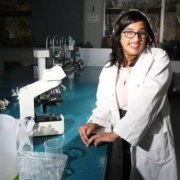Born in Sri Lanka in 1994, Jerusha was destined to achieve great things.
She was diagnosed with atheoid cerebral palsy by doctors in Sri Lanka who said that it was unlikely she would ever walk or talk.
With this information, her parents decided to immigrate to Australia where they could access a more advanced medical system.
Atheoid cerebral palsy, otherwise known as dyskinetic cerebral palsy is characterized by abnormal, involuntary movement.
It’s safe to say that she proved those doctors wrong. Not only can she walk and talk, she attended mainstream primary and high schools, and has completed a Bachelor of Science (Biomedical Sciences) at Victoria University and a Biomedical Sciences honours year at RMIT University.
With those qualifications under her belt, she commenced a PhD at Victoria University in the area of biomedical sciences, and is currently investigating if strength training can improve neuromuscular and motor function in adults with cerebral palsy.
This means she’s working on finding out if there are ways to improve the way a person’s brain communicates with their muscles, which could make a difference to their ability to move their muscles.
Jerusha’s schooling experience
At school, Jerusha says she “did okay.”
While she experienced bullying and had some challenges making friends and managing her workload, she says:
“I got involved in a lot of fun things (including music, reading, and sport) and focused on the positive things. I made a difference in my community.”
Though Jerusha’s experience at school was largely positive, she knows there’s plenty of room for improvement.
“I think we need to think about tasks differently, and design them to focus on the person’s strengths and abilities. We need to build online interactive learning and testing platforms that support the student’s abilities.
“We definitely need to develop better software for people with CP, and create appropriate support services that are professional and thoughtful. We also need to be flexible and open minded about things,” offered Jerusha.
Finding her passion
It was midway through high school that Jerusha realised her calling.
“I have always had a strong desire to help people. I also loved biology and thought medicine was a perfect career pathway to do this,” she said.
Fast forward a few years and Jerusha has certainly made her mark on the medical field through her research, and additionally with her efforts in advocating for changes to the Australian medical school entrance testing structure.
Advocating for change
For many years Jerusha has dreamt of becoming a medical doctor. As a young person she wished she could have had a doctor with similar life experiences to her own—someone who could relate to her personally and also relate to her condition.
With few examples out there, Jerusha is aiming to become the doctor she wishes she had as a young person. She knows that as a medical doctor she will be able to approach her patients with a level of empathy and understanding that many others don’t have.
Jerusha says:
“I would like to change perceptions and ideals of people with a disability in medicine, and challenge and disrupt discriminative systems in medicine and make them inclusive.”
She says the entrance exam alone (GAMSAT – Graduate Medical School Admissions Test) is brutally challenging.
“The GAMSAT is not like typical university exams as they’re not testing prior knowledge. It’s a timed and hand written test which assesses a person’s ability to solve problems.
“Like what is offered to indigenous students, there also needs to be special pathways and entry schemes for students with a disability that consider their disadvantage and consider them on their merit and abilities.”
“There’s also an interview component where discrimination can occur as someone could easily judge me based on my disability and underestimate my ability,” said Jerusha.
Changing the selection criteria
Jerusha is working alongside a representative from the Australian Medical Association to change the selection criteria.
“There is a clause with a policy document created by the Australian Medical Council that states that medical schools should create special entry schemes for disadvantaged groups, and we are using this clause to fight very hard for the rights of students with a disability.
“We are building a very strong case that will ensure that no discrimination (from medical schools) occurs in the future,” said Jerusha.
Not only will this give Jerusha a greater chance of gaining entrance into medical school, it’ll be a huge win for people with disabilities who wish to become doctors.
If alternative entry pathways are implemented then Jerusha believes more students with disabilities will feel comfortable disclosing their disability, which will allow medical schools to prepare for the student’s journey ahead of time.
This, she says, will help medical students to approach things like completing exams and clinical placements without so much pressure, stress and difficulty.
Jerusha’s advice for others with CP looking to make their mark
“Do not give up on your mission to create a difference. You will get there. I think your ideas and stories are important in creating a diverse and inclusive society. Creative minds are much needed in today’s society. Talk about and action them,” said Jerusha.



